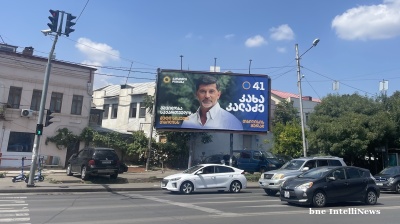33 years on from its independence, the South Caucasus country of Georgia is preparing for the most impactful vote in its history.
On October 26, voters will head to the polls in what promises to be a momentous and dramatic election. The ruling Georgian Dream (GD) party, in power since 2012, has taken a sharply pro-Russian turn over the past two years, aligning more and more closely with Moscow while denigrating Georgia’s erstwhile Western partners. Challenging them is the fractious Georgian opposition, which has coalesced into a handful of key coalitions. Expectations for election day include voter fraud, mass public demonstrations and even violence.
Amidst this battle, one curious thread has gone underreported. Facing unprecedented public dissatisfaction, Georgia’s ruling party has dangled a particularly juicy carrot in front of the electorate: the possibility of regaining the Russian-occupied separatist regions of Abkhazia and South Ossetia, outside of Georgian control since the early 1990s.
The first rumblings on this front came on September 15. In a public address, Bidzina Ivanishvili, the billionaire at the head of Georgian Dream, promised to ‘apologise’ to South Ossetia for the 2008 war that saw Russia invade and defeat Georgia in five days of fighting. Speaking from Gori, a Georgian city just ten kilometres from the de facto border with South Ossetia (and that was itself briefly occupied by Russian forces in 2008), Ivanishvili vowed that his government would ‘bring justice’ to ‘those who instigated the war’ — a reference to the United National Movement, Georgian Dream’s primary opponent. This, Ivanishvili promised, would be the first step in reconciling with Georgia’s breakaway regions and would occur immediately after the October 26 election — if his party was victorious.
Two weeks later, Ivanishvili expanded on this platform. On September 28, he announced that his party would reinstate Georgia’s territorial integrity on the basis of ‘reconciliation and mutual trust’ with Abkhazia and South Ossetia. Georgia’s constitution would be amended to accommodate such a move, Ivanishvili said, as his party would oversee the ‘peaceful restoration’ of Georgia’s 1991 borders.
Ivanishvili’s promise was extremely bold, one that would likely ignite the public imagination, in a clear hope to rally voters before the October 26 election. While there is precious little indication of how this would work in practice — or whether there is anything in reality underscoring this ‘reconciliation’ — there are reasons the Georgian leader suggested it, as well as impacts he may not necessarily have expected.
“This entire idea [of reintegrating South Ossetia and Abkhazia] — to be frank, it is just nothing,” said Iago Kachkachishvili, chairman of the Tbilisi-based Institute of Social Studies and Analysis. “It is not supported by any activity done by the government in this regard. It is purely an empty message,” he said.
The main impetus for even suggesting this idea was likely an attempt to promise some sort of progress to potential voters ahead of the election. With faltering economic numbers and mass emigration in recent years, the Georgian Dream administration has been struggling to provide any positive message to the public, Kachkachishvili said.
“Georgia is facing so many problems — unemployment, poverty, high prices, emigration and so on, and Georgian Dream has not been able to address any of these,” Kachkachishvili said. “I think they just remembered at some point that this [the Abkhazia and South Ossetia conflicts] is a very painful issue for Georgia and Georgians, so they decided, ‘okay, let’s start talking about this.’ As if it is a very simple and easy problem [to resolve],” he said.
Georgia’s conflicts with Abkhazia and South Ossetia have now lasted decades, with no real progress towards an eventual resolution. An entire generation of Georgians has grown up that have never known a united Georgia, one in which Sukhumi and Tskhinvali (the two separatist capitals) were under Georgian control. Yet despite that, the topic of territorial integrity — and of reasserting Georgian sovereignty over those regions lost more than 30 years ago — remains of paramount importance for Georgian society.
“Like everywhere in the world, economic concerns are the top priority among Georgian voters,” said Dustin Gilbreath, a non-resident senior fellow at the Tbilisi-based Caucasus Research Resource Center, who has worked with polling data on Georgian society for many years. “Things like unemployment, cost of living, poverty, pensions — these are at the top of the list [of voters’ concerns]. But right after that are territorial integrity and the unresolved conflicts [with Abkhazia and South Ossetia]. So this is definitely a salient issue for Georgians,” Gilbreath said.
The past two and a half years have further elevated security concerns among Georgian voters, Gilbreath said. Russia’s ongoing invasion of Ukraine has served as a stark reminder of how vulnerable Georgia — with a tenth of Ukraine’s prewar population and just a fraction of its territory — remains to military aggression from its northern neighbour. In light of that, the promise of a peaceful solution to the Abkhazia and South Ossetia problems may have been presented as a balm for a wary society.
“That Georgians are more concerned about security [than they were three years ago], in my opinion, is almost unquestionable,” Gilbreath said. “It’s possible that this proposal [for reintegration] may be directed at those voters who are unsure about Georgian Dream because of security-related concerns. Whether that will actually work, I don’t know,” he said.
According to Kachkachishvili, the result to date has been the opposite, sparking discontent among the Georgian public.
“The feedback from society [towards Ivanishvili’s remarks] was very, very angry,” he said. “The proposal was so ungrounded that it received the reverse reaction of what [Georgian Dream] was looking for. I would say that this whole message around territorial integrity failed badly,” Kachkachishvili said.
The past few months in relations between Abkhazia and its longtime patron, Russia, make Ivanishvili’s claims all the more interesting.
While Abkhazia remains dependent economically, militarily and politically on Russia — one of the only countries in the world that recognizes its independence — the unrecognised Black Sea state has long fought to maintain its autonomy, a fight that has sometimes brought it into conflict with Moscow. These disagreements have escalated in recent months. In June, Abkhazia’s parliament was forced by mass demonstrations to withdraw a highly controversial law that would allow Russians to purchase property in the territory, a longstanding source of tension between the two. Sukhumi has also demurred on passing its own version of the Russian-inspired ‘foreign agents law’ — ironically, in contrast to Georgia, where GD’s adoption of such a law in May sparked mass protests. These developments contributed to Russia withdrawing all its subsidies for Abkhazia in September, funding on which the breakaway state is deeply reliant.
Against this background, some have wondered whether the break in Russian-Abkhaz relations may mean that Moscow is prepared to aid Ivanishvili’s proposal to return the territory to Georgian control.
“It’s an interesting idea, but I don’t think it’s reality,” said Kachkachishvili. “After [Ivanishvili’s] remarks, [Russian Foreign Minister Sergei] Lavrov came out and said, ‘look, we are not going to revise our decision of recognising South Ossetia and Abkhazia as independent states.’ I was a little bit surprised, because he could have said, you know, ‘we are reviewing this proposal and we will see how it develops,’ but he did not. And I think this was a bit of a cold shower for the Georgian government,” Kachkachishvili said.
Public comment from Moscow has been mixed but noncommittal. Lavrov further stated that Russia was ready to “help normalise relations” between Georgia, Abkhazia and South Ossetia, a remark echoed by Russian foreign ministry spokeswoman Maria Zakharova. The latter added that “the [three] countries are ready to turn the page, with the emphasis on consolidating the statements made into concrete practical cases.”
Absent from all of this has been any positive response from the two breakaway territories themselves. Abkhazia and South Ossetia have themselves felt particularly vulnerable over the last two and a half years, with Russia withdrawing most of its forces in each to transfer to the Ukraine invasion that has monopolised its attention. The growing rapprochement between Tbilisi and Moscow has further raised fears in Tskhinvali and Sukhumi — as has the military conquest by Azerbaijan of Nagorno-Karabakh, the other breakaway state in the South Caucasus, last year. Against this backdrop, Ivanishvili’s remarks about the ‘reintegration’ of Abkhazia and South Ossetia may even have the opposite effect of driving paranoia and anti-Georgian sentiment in those two regions yet higher.
“The Abkhaz themselves are in a sorry situation,” Kachkachishvili said, in remarks that could almost as easily be applied to South Ossetia. “Russia is playing with them — they say, ‘we support you’, but then they cut this support. They are just victims of this Russian imperialism, like Georgia and all the small states of the Caucasus.”
Features

Europe remains Russia's number one biggest importer of gas, top five importer of oil in August
US President Donald Trump complained that the EU is still importing too much Russian oil and that the White House will not put sanctions on Russia unless the EU cuts back on this business.
_1758174730.jpg)
Indonesia’s Raja Ampat - tourism hub or den of corruption?
In recent years, Indonesia has doubled down on promoting Raja Ampat, a remote archipelago in West Papua famed for its biodiversity, as a global eco-tourism icon.

Flood corruption scandal shakes the Philippines
The Philippines is grappling with a widespread controversy surrounding its flood control programme, with allegations of billions of pesos being siphoned off from projects meant to protect vulnerable communities.

The European Commission proposes to “creatively” tap Russia’s $300bn of frozen assets with Reparation Loans
The European Commission is floating a new idea of how to “creatively” tap Russia’s $300bn of frozen assets without the need to appropriate, which is legally questionable, by replacing the money transferred to Kyiv with EU-backed bonds.




